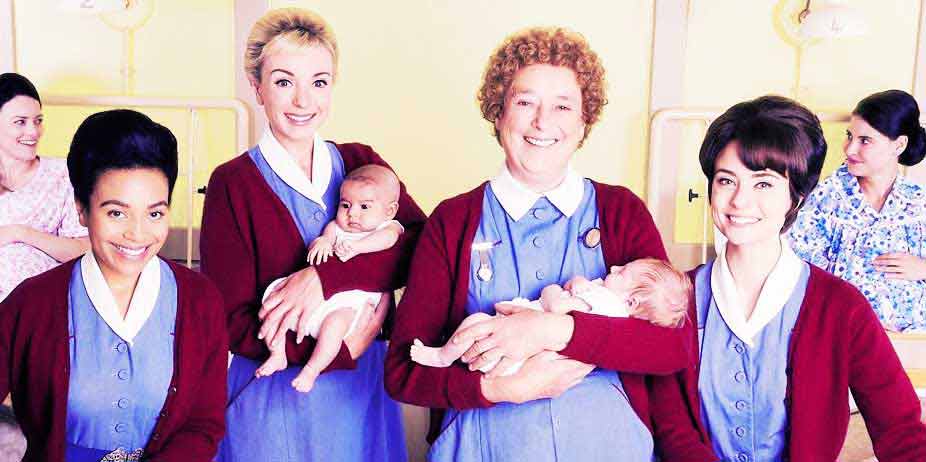
Call the Midwife, Season 6 (2017)
Rather than spend Christmas at Poplar, the nuns and midwives of Nonnotus House travel to Africa in order to help out at a missionary outpost. Faced with a water shortage and limited supplies, Sister Julienne (Jenny Agutter) strives to soften the heart of a neighbor with reason to hate the local doctor and her clinic, Nurse Crane (Linda Bassett) delivers a baby in the Sahara, and Trixie (Helen George) convinces Tom (Jack Ashdon) there's no time like the present to propose to Barbara (Charlotte Richie). Cheerful but exhausted from hard work, they return to England and find their work environment changed forever.
Since Julienne has been gone, Sister Ursula has been in charge. Strict and no-nonsense, she intends to stay on as the superior midwife, displacing Julienne and causing massive difficulties among the midwives when her increasingly demanding rules force them to cut corners with their expectant mothers. After facing a case of domestic abuse, Sister Cynthia (Bryony Hannah) suffers a mental breakdown and Ursula dispatches her without a word to the mother house. Sister Monica Joan (Judy Parfitt) continues to deteriorate into dementia, and is upset that the family television has gone missing. Patsy (Emerald Fennell) receives devastating news from her father in Japan that force her to abandon them, possibly forever, leaving her secret girlfriend Delia (Kate Lamb) heartbroken, Trixie finds potential love and further challenges in the arms of the new district dentist, and Shelagh (Laura Main) and Doctor Turner (Stephen McGann) receive shocking news.
Before the end of the season, the series has dealt with major issues on a level unseen in former years; prejudice, racial injustices, female circumcision, domestic abuse, mental illness, biracial marriage, and down syndrome, including revisiting the child born without limbs and the family's struggle for normality. Cast members blink in and out, sometimes gone for a half dozen episodes, while introducing a new nurse. The nuns deal with a variety of issues ranging from a woman's gum decay to the arrival of "the pill," and the devastating consequences it has when a woman takes too many at one time. It doesn't shy away from controversial issues, while dealing with them in a blend of sensitivity and faith. The sisters' faith continues to motivate their decisions, while they grapple with important moral questions.
Some series outlive their usefulness, but this one hasn't; it's now 1962 and along with the changing hairstyles come differing attitudes, but what remains motivational about the series is the complex human relationships woven throughout, both in the expectant parents and their individual stories and the ongoing saga of our favorite midwives. Each character has their time to shine and by the end of the season, after a carousal outside the house, an impromptu wedding, and a bittersweet reunion, it leaves us, as always, eager for more.
Sexual Content:
Many pregnancies, a few mentions of premarital sex; some
discussion about female body parts, including an episode focused on female
circumcision (brief conversation about what that entails). A lesbian couple
kisses in the final episode; many heterosexual couples kiss throughout the
episodes.
Language:
Scattered occasional profanities and uses of "God."
Violence:
Births are sometimes difficult and/or taxing on the mother;
examination of afterbirth and some blood. One episode deals with domestic abuse,
and the man kicks and throws his pregnant wife around, breaking a window in
their house and locking her in her room.
Other:
None.
